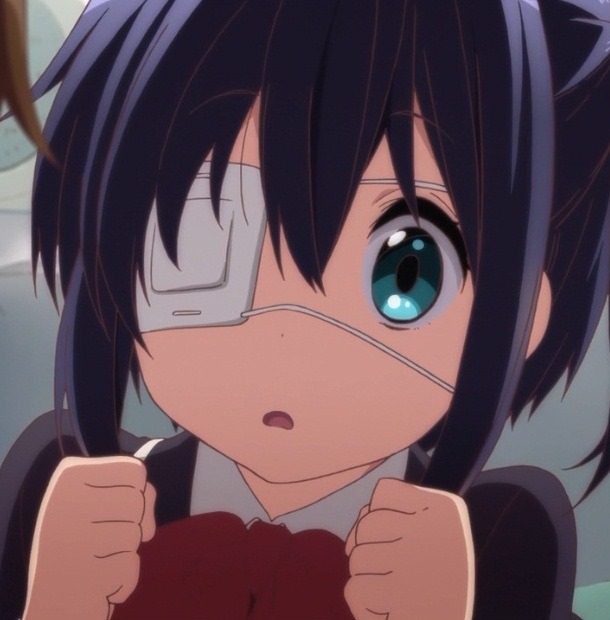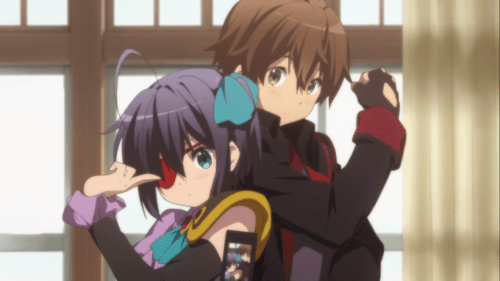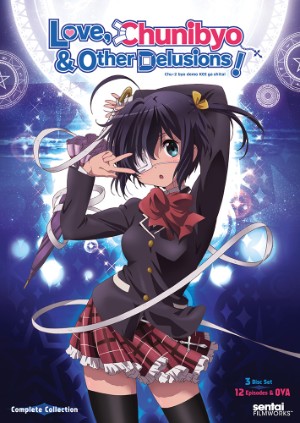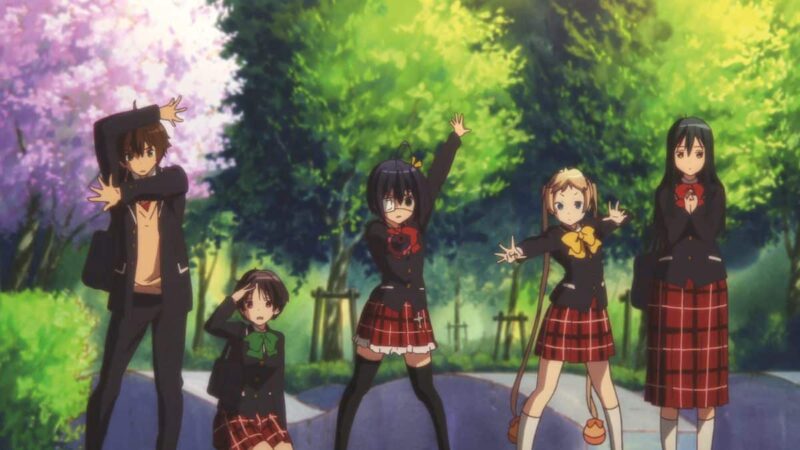
Love, Chunibyo, and Other Delusions explores the psychology of avoidance, coping with change, and seeing magic in everyday things. And it is a love story. The story centers around Rikka and Yuta, a pair of high school students (because life ends after high school, or because most people never leave high school). Rikka has chunibyo, a delusion that fills her perception of the world with magic and battles. Headlights on a river become the magic of the “invisible boundary.” An umbrella becomes a magical-shield weapon. Friends and fellow chunibyo become people to battle. Rikka sees magic in the mundane and adventure in everything. Yuta is recovering from his own round of chunibyo, and he’s embarrassed by his history. The rest of the cast, mostly girls–but this isn’t a harem–suffers from their various other delusions and avoidance patterns.
At its heart, Love, Chunibyo, and Other Delusions is about growing up and how to navigate romantic feelings. Yuta is, self admittedly, dense and uncertain how to go about the feelings he has for Rikka. Rikka, for her part, tries to fit her feelings for Yuta into her way of coping with the stress of growing up. Chunibyo is a chosen delusion. All the characters with it know they are doing it, and they also know why. In Rikka’s case, she avoids facing the finality of her father’s death and her fear of her feelings for Yuta. She and other try to avoid the mundane grind of daily life. The adult characters see chunibyo as childish and fail to see it as a bridge toward adulthood. Rikka and the other character grow up over the course of the series. It’s a slow process, but it is a process nonetheless.
During my revisit, I watched the English dub. Margaret McDonald voiced Rikka. Yuta and Rikka slowly progress in their relationship, beginning with pinkie clasping to hand holding. McDonald’s voicing of Rikka, especially during those shy, embarrassed scenes between her and Yuta, sparked the memories of my first girlfriend’s voice. Memory may be one of the main reasons why many older anime fans enjoy high-school anime.
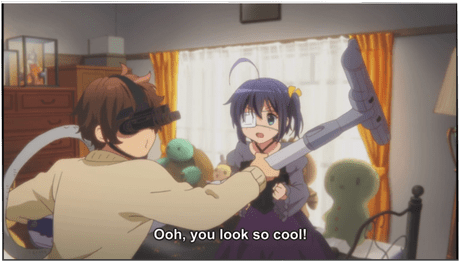
High school romance anime provide a way to reminisce and to consider what-might-have-beens. Beyond the fact most anime watchers are in high school or not far from it, the popularity of such stories among older watchers seems to tie into this. In my case, high school was nothing but work. I didn’t have interest in going to dances, dating, or anything of the sort. I began working as soon as I was of legal age; I knew I had to work through college so began to save early. I was the first in my poor, lower-class family to attend university, and (with the danger of boasting) the first in the family to earn several degrees, including a Masters. For perspective, Al Capone is in the family tree. High school anime like Love, Chunibyo, and Other Delusions offers a way to enjoy what-might-have-been in many ways. It helps me consider a time where many people have freedom to explore relationships and themselves, a time before work obligations and other adult responsibilities. The anime showed a time I never had. When I turned 18, my parents told me they had willed my younger brother and sister (13 and 8 years old at the time) and the house to me if something would happen to them. Thankfully, nothing did, but such responsibilities grow you up quickly.
Most of us go through a chunibyo phase in some form or another. Many use video games for that outlet. If I may confess a bit more: sometimes, even now in my 40s, when I’m out hiking I imagine myself as Link from the Legend of Zelda. The Zelda theme song plays in my mind, and the nature around me fills me with a sense of adventure and of wonder. Of course, I’m not about to act out such imagination (at least where people can see), but the magic it lends to the world reminds me of what we lose in our adulthood. In the anime, Rikka resists losing this sense of wonder that surrounds us. The other day, as I worked on a video project, it struck me how magically technology really is. We flick a switch, or speak a command, and lights turn on. We hold a remote control and press a button. Bam! We fill a screen with people and story. We touch a sheet of glass and can talk to people across the world. Technology really is magic.
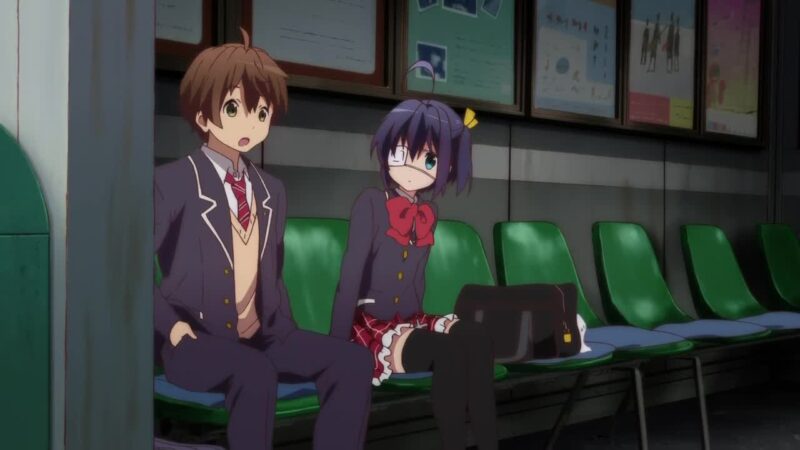
Love, Chunibyo, and Other Delusions shows us how a childlike sense of wonder looks foolish and delusional. Love itself is a delusion. Yet, “delusion” makes the world more vibrant and, oddly enough, more real. This provides a tension throughout the anime. They want to “grow up” but the dullness of such a perspective drives them back toward delusion.
The romance between Rikka and Yuta isn’t as rife as some anime couples, and it moves slowly. Yet, despite the addition of delusions, it feels natural. Their love charms. Anime like this offers an innocence that you can’t find in most live-action dramas. Hallmark films offer the same appeal, now that I think about it.
Love, Chunibyo, and Other Delusions is worth a watch. It explores psychology from an interesting perspective and does a good job with showing the conflicts among the heart and head and society. Rikka is also quite a cute, vibrant character. If only Yuta wasn’t a lunkhead, but in his defense, he knows he doesn’t really understand and often asks for advice from the other female characters. McDonald steals the show with her rendition of Rikka. During my rewatch, I found I enjoyed the story more than I had when I first watched it. Sometimes it helps to revisit a story you feel neutral about.
If you haven’t watched Love, Chunibyo, and Other Delusions, give it a watch. It reminds you, no matter your age, that the world really is full of wonders and that your imagination can still see them if you allow it.
